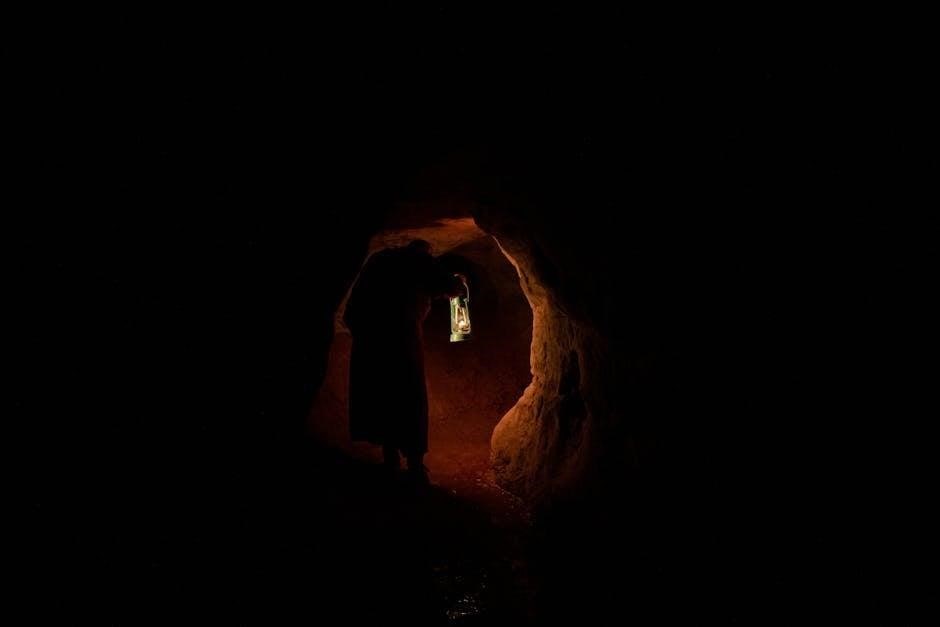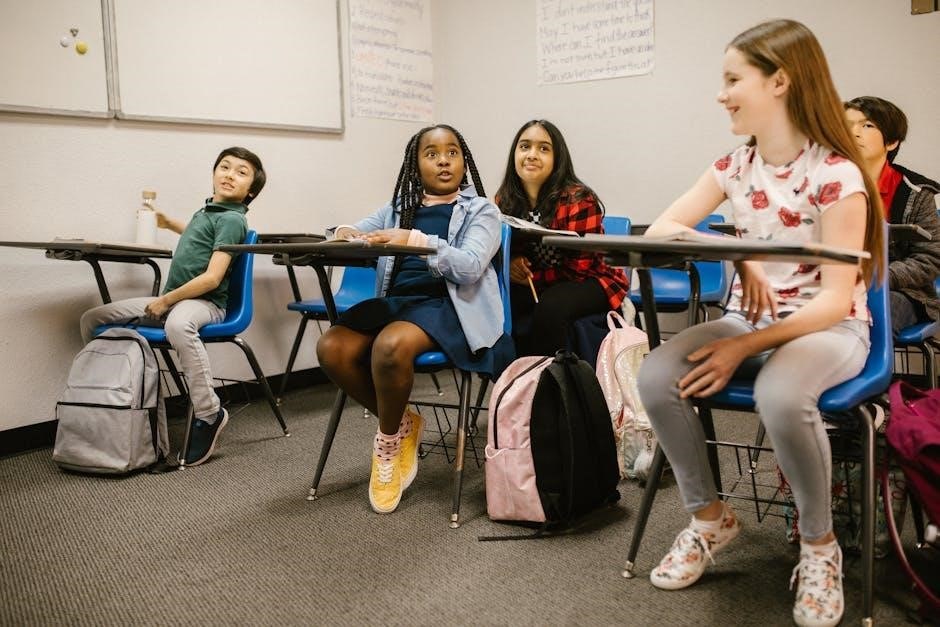
The Air Force Junior ROTC Cadet Creed guides cadets in developing citizenship, leadership, and responsibility. The program fosters community service, physical fitness, and academic excellence, preparing students for future challenges.
What is AFJROTC?

The Air Force Junior ROTC (AFJROTC) is a high school program designed to develop citizenship, leadership, and character in cadets. It is part of the Junior Reserve Officers’ Training Corps (JROTC) and is sponsored by the U.S. Air Force. The program emphasizes aerospace education, leadership development, and community service, preparing students for college, careers, and military service. Cadets participate in extracurricular activities such as drill teams, color guards, and academic competitions. The curriculum includes lessons on Air Force history, core values, and life skills like teamwork and time management. AFJROTC is led by retired Air Force instructors who mentor cadets in achieving their full potential. The program fosters a sense of discipline, responsibility, and patriotism, while offering opportunities for personal growth and development. Cadets also wear uniforms and participate in ceremonies, reflecting their commitment to the program’s values.
The Air Force Junior ROTC Cadet Creed
The Air Force Junior ROTC Cadet Creed is a foundational statement that outlines the core values and principles guiding cadets in the program. It emphasizes commitment to country, service, and personal development, serving as a moral compass for cadets. The creed highlights the importance of integrity, loyalty, and discipline, while fostering a culture of respect and accountability. Cadets are expected to embody these principles in their daily lives, both within and outside the program. The creed also underscores the pursuit of excellence and self-improvement, encouraging cadets to strive for their best in academics, leadership, and community service. By adhering to the creed, cadets develop a strong sense of purpose and responsibility, preparing them for future roles as leaders and citizens. It is a unifying force within the AFJROTC community, inspiring cadets to uphold the highest standards of conduct and character.
Admission Standards and Disenrollment
Admission to the Air Force Junior ROTC (AFJROTC) program requires meeting specific standards, including maintaining a minimum GPA, demonstrating good citizenship, and adhering to behavioral expectations. Cadets must also be U.S. citizens or legal residents and meet age requirements. The program emphasizes academic and personal responsibility, with regular evaluations to ensure cadets are progressing satisfactorily. Failure to meet these standards, such as poor academic performance or misconduct, may result in disenrollment. The AFJROTC Cadet Guide provides detailed criteria for admission and disenrollment, ensuring fairness and consistency. Cadets are expected to uphold the program’s values and standards throughout their participation. Disenrollment is typically a last resort, following warnings and opportunities for improvement. The program aims to foster growth and success, but it also maintains high expectations for its cadets.
Cadet Life and Expectations
Cadet life involves community service, leadership roles, and physical fitness training, fostering personal growth and responsibility. Expectations include adhering to a strict code of conduct and maintaining academic excellence.
Community Service and Mentorship
Community service is a cornerstone of AFJROTC, fostering leadership and citizenship. Cadets participate in local events, such as food drives, charity walks, and environmental cleanups. Mentorship plays a vital role; senior cadets guide younger ones, helping them develop skills and confidence. This mutual support strengthens unit cohesion and prepares cadets for future responsibilities. Additionally, mentorship programs encourage teamwork and the pursuit of academic and personal goals. Through these activities, cadets learn the importance of giving back to their communities while building strong, lasting bonds with their peers.
Leadership Roles for Cadet Officers
Leadership roles in AFJROTC are designed to empower cadets with decision-making skills and accountability. Cadet officers lead teams, plan events, and mentor younger cadets, fostering a culture of discipline and teamwork. These roles range from squadron commanders to flight leaders, each requiring strong communication and organizational abilities. Officers are responsible for setting examples, enforcing standards, and motivating their peers to achieve program goals. Through these roles, cadets gain hands-on experience in leadership, preparing them for future challenges in both military and civilian life. The AFJROTC program emphasizes the importance of ethical leadership, teaching cadets to inspire and guide others effectively. By taking on these responsibilities, cadets develop confidence, resilience, and a sense of duty that benefits them throughout their lives. Leadership is a cornerstone of the AFJROTC experience.

Physical Fitness and Training
Physical fitness is a cornerstone of the AFJROTC program, fostering discipline, teamwork, and personal health. Cadets participate in regular physical training sessions, which include exercises like push-ups, sit-ups, and running. These activities aim to build strength, endurance, and agility. Additionally, cadets are encouraged to maintain a healthy lifestyle, including proper nutrition and hydration. Physical training also serves as a platform for team-building activities, such as relay races and group exercises, which promote unity and camaraderie. Fitness assessments are conducted periodically to monitor progress and ensure cadets meet program standards. The emphasis on physical fitness prepares cadets for the rigors of military life while also fostering a lifelong commitment to health and wellness. Through physical training, cadets learn to push their limits and develop resilience, essential for overcoming challenges in all areas of life.

Academic and Professional Development
The AFJROTC program emphasizes a structured curriculum and lesson plans to enhance cadets’ academic and professional skills. Portfolio development, interviews, and continuous self-improvement activities foster personal and career growth effectively.
Curriculum and Lesson Plans
The AFJROTC curriculum is designed to provide cadets with a comprehensive understanding of aerospace science, leadership, and citizenship. Lesson plans are structured to promote critical thinking and problem-solving skills, aligning with academic and professional development goals. Cadets engage in interactive learning activities, including aerospace science modules, leadership exercises, and character education. The curriculum also emphasizes Air Force history, core values, and career opportunities, preparing cadets for future challenges. Instructors use multimedia presentations, group discussions, and hands-on projects to make learning engaging and effective. Regular updates to the curriculum ensure relevance and alignment with modern educational standards. This balanced approach fosters academic excellence, personal growth, and preparation for both military and civilian careers. Through structured lesson plans, cadets gain valuable knowledge and practical skills, enhancing their readiness for future endeavors. The curriculum serves as a foundation for continuous self-development and lifelong learning.
Portfolio Development and Interviews
Portfolio development is a key component of the AFJROTC program, enabling cadets to showcase their achievements, skills, and experiences. Cadets are encouraged to maintain a comprehensive portfolio that highlights their leadership roles, community service, academic accomplishments, and personal growth. This portfolio serves as a valuable tool for self-assessment and career planning, demonstrating their readiness for future opportunities. Interviews are also an integral part of the program, providing cadets with the chance to articulate their goals, values, and aspirations. Whether for leadership positions, scholarships, or college applications, these interviews help cadets refine their communication skills and confidence. The AFJROTC Cadet Guide provides detailed guidance on creating effective portfolios and preparing for interviews, ensuring cadets are well-equipped to succeed in their academic and professional pursuits. This process fosters continuous self-development and prepares cadets for lifelong success.
Continuous Self-Development and Growth
Continuous self-development is a cornerstone of the AFJROTC program, fostering personal and professional growth in cadets. The AFJROTC Cadet Guide emphasizes the importance of self-improvement through goal-setting, mentorship, and reflection. Cadets are encouraged to engage in regular self-assessment, identifying strengths and areas for improvement. The program promotes lifelong learning, encouraging cadets to pursue additional education and skills outside the classroom. Mentorship from senior cadets and instructors provides guidance and support, helping cadets stay on track with their development. Feedback loops ensure cadets receive constructive criticism to refine their skills. By fostering resilience and adaptability, the program prepares cadets to embrace challenges and grow into disciplined, self-disciplined individuals. This focus on continuous growth equips cadets with the mindset and tools needed to succeed in both their academic and future professional lives.

Traditions and Program Structure
The AFJROTC program is built on rich traditions, including the Cadet Creed and structured hierarchy. It emphasizes discipline, teamwork, and adherence to military customs, fostering a sense of unity and pride.

The Organization and Traditions of Service
The AFJROTC program is structured to reflect the hierarchy and traditions of the U.S. Air Force, emphasizing discipline, respect, and teamwork. Cadets are organized into units with defined roles, mirroring military ranks and responsibilities. The program upholds traditions such as the Cadet Creed, which outlines core values like loyalty, respect, and self-discipline. These traditions foster a sense of unity and shared purpose among cadets. Community service is also a cornerstone, reinforcing the importance of giving back to society. Mentorship programs further strengthen the bond between senior and junior cadets, promoting leadership development. By adhering to these traditions, AFJROTC instills the values of service, integrity, and excellence, preparing cadets for future challenges in both military and civilian life.

Uniforms and Drill Ceremonies
Uniforms in AFJROTC are worn with pride, reflecting the professionalism and discipline of the U.S. Air Force. Cadets are issued specific uniforms, including the Airman Battle Uniform (ABU) and the Service Dress Uniform, each with precise grooming and wear standards. Properly wearing the uniform is a sign of respect for the program and its traditions. Drill ceremonies, such as marching drills and color guard presentations, are integral to the program, teaching teamwork, precision, and leadership. These ceremonies often occur during school events, parades, and competitions, showcasing cadets’ skills and unity. Mastery of drill movements fosters discipline and esprit de corps, while uniforms serve as a visual representation of the cadets’ commitment to the AFJROTC values of service, integrity, and excellence.
Extracurricular Activities and Competitions
AFJROTC offers a variety of extracurricular activities and competitions that enhance cadets’ skills and teamwork. These include drill teams, color guards, and academic competitions, fostering discipline and camaraderie. Cadets can participate in cyber patriot competitions, model rocketry, and leadership camps, which prepare them for STEM careers and military service. Competitions like the National Drill Championship test precision and unity, while community events showcase cadets’ dedication. These activities promote personal growth, leadership development, and esprit de corps, providing memorable experiences beyond the classroom. By engaging in these pursuits, cadets build lasting bonds and gain confidence, ensuring they are well-rounded individuals ready to excel in their futures. Extracurricular involvement is a cornerstone of the AFJROTC experience, enriching cadets’ lives and preparing them for success.
The AFJROTC program is a transformative experience that fosters personal and professional growth among cadets. By emphasizing leadership, discipline, and community service, it equips students with essential life skills and a strong moral foundation. The program’s structured curriculum, combined with extracurricular activities, ensures cadets develop into responsible, resilient, and compassionate individuals. Whether pursuing military service or civilian careers, AFJROTC alumni are prepared to meet future challenges with confidence and integrity. The lessons learned and bonds formed during their time in the program remain invaluable, shaping their character and guiding their path toward success. AFJROTC is more than an educational program—it is a gateway to lifelong opportunities and a tradition of excellence.
Leave a Reply
You must be logged in to post a comment.